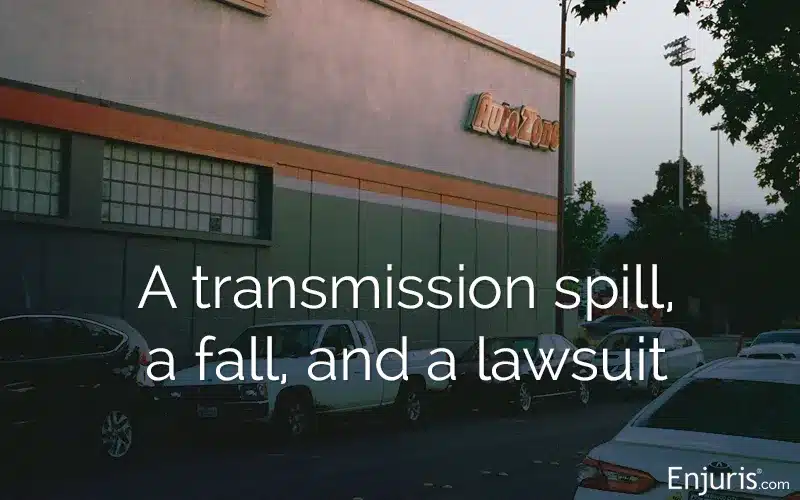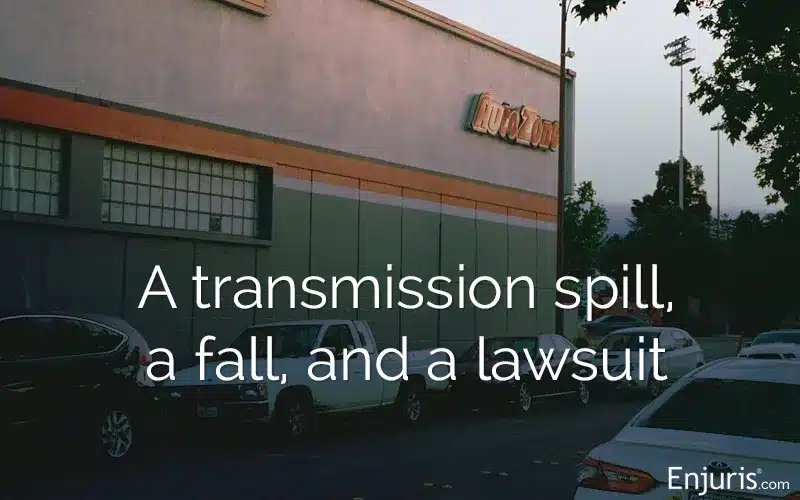[ad_1]

A Florida slip-and-fall accident can happen anywhere… which is now a tough lesson learned by the Ocala AutoZone.
An Ocala woman won a $1 million lawsuit against AutoZone in September 2021 after she slipped on spilled transmission fluid in the store. She successfully sued the automotive retail chain and won after evidence at trial indicated that AutoZone was aware of the spill but did not take immediate action to clean it.
Why did an Ocala woman sue AutoZone?
Kimberly Warner was shopping at AutoZone in Ocala on September 25th. As she was walking through the parking lot of the store, she slipped and fell on transmission fluid that had spilled. Her claim went to trial, at which time representatives of AutoZone admitted that they knew about the spill for about an hour and did not attempt to clean it in that time.
The defendant, AutoZone, tried to use the Florida pure comparative negligence standard as part of its defense, claiming that Warner was partially at fault for the accident. The jury decided that she was responsible for 5% of the cause of the accident and the store was responsible for 95% of the liability.
Here’s how Warner’s award was presented:
- $157,956 for past medical expenses
- $300,000 for future medical expenses
- $500,000 for future damages, including pain and suffering, disability, physical impairment, disfigurement, mental anguish, inconvenience, aggravation of a disease or physical defect and loss of capacity for enjoyment of life
Why is this verdict significant?
A plaintiff might win a large damage award against a store for a slip and fall if the store was found significantly negligent, as in not cleaning up a known hazard like a spill, leading to the injury. The award compensates for medical expenses, pain and suffering, and other damages resulting from the accident. High negligence on the store’s part can lead to larger settlements or judgments to cover the plaintiff’s various losses and suffering.
That’s what happened for the AutoZone plaintiff.
Florida does not have a “wet floor law,” as is present in some other states. In other words, a business is not required to place a sign that warns a customer if there is a hazardous condition like a spill or leak that could cause slippery surfaces.
However, the business owner is responsible for maintaining a safe and hazard-free environment. They are required to recognize and address a risk like a slippery floor in a timely manner. A wet floor is the top cause of slip-and-fall accidents in Florida; and it’s the cause of more than half of fall accidents in businesses everywhere.
There are several key factors in finding a business owner responsible for a slip and fall injury from a wet floor:
- Duty of care. Store owners have a legal duty to maintain their premises in a reasonably safe condition for customers. This includes promptly cleaning up spills and warning of wet floors or other hazards.
- Knowledge of the hazard. For a store to be liable for injuries from a slip and fall accident, it must be proven that the store knew or should have known about the hazard in time to take action to prevent it. This is often established by showing that the hazard existed for such a length of time that the store employees should have discovered and remedied it.
- Constructive knowledge. Under Florida law, constructive knowledge of a dangerous condition can be proven by showing that the condition existed for a sufficient length of time that the business should have known about it, or occurred with regularity and was therefore foreseeable.
- Comparative negligence. Florida follows a comparative negligence rule, meaning that if the injured party is found to be partially at fault for their own injuries (for example, not paying attention to where they were walking), their compensation may be reduced by their percentage of fault.
- Burden of proof. The injured party must prove that the store was negligent in failing to maintain the premises safely or warn of the danger.
- Notice requirement. Florida statutes may require that the injured party provide notice to the store owner within a certain timeframe after the accident, especially in cases against government entities or certain businesses.
Store owners must conduct regular inspections, clean up spills promptly, and place warning signs around hazards to mitigate the risk of slip and fall accidents and potential legal liability. If a person is injured in a slip and fall accident, it’s crucial to document the incident, gather evidence, and seek legal advice to understand their rights and potential for compensation.
[ad_2]



